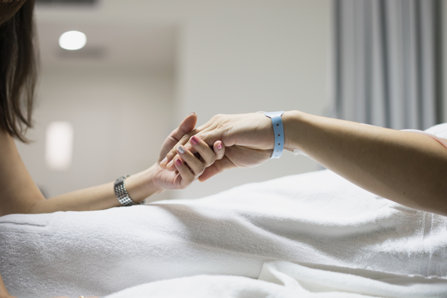Should Family Members Have a Right to Know When a Loved One Overdoses on Drugs?

As soon as we get into the realm of medicine, patient medical history, physical health, and mental health, we start walking on delicate ground. On the one hand, it is essential to maintain privacy and personal confidentiality when it comes to an individual’s medical history. But at the same time, human beings heal best when their family members and loved ones are close by, well informed of the situation.
In the case of drug overdoses, we see this difficulty as clear as day. As it currently stands, medical offices are under no obligation to inform Mom and Dad when an adult son or daughter is treated for a near-fatal drug overdose. Patient confidentiality is a sacred thing in medicine, for a lot of reasons.
So how can parents and family members ensure that they stay informed in the event that their loved one might experience an overdose?
Why Wouldn’t Family Members Be Informed of a Loved One’s Overdose?

HIPAA confidentiality is the key ruling here. HIPAA stands for the Health Insurance Portability and Accountability Act. Passed in 1996, HIPAA was a measure taken to protect the safety and privacy of patients’ medical data.
Quoting the Department of Health Care Services for the state of California,: “The HIPAA Privacy regulations require healthcare providers and organizations, as well as their business associates, to develop and follow procedures that ensure the confidentiality and security of protected health information (PHI) when it is transferred, received, handled, or shared. This applies to all forms of PHI, including paper, oral, and electronic, etc. Furthermore, only the minimum health information necessary to conduct business is to be used or shared.”
In simpler terms, this means that when a patient receives medical care at any medical institution, that medical institution is obligated by law to keep the details of that medical care confidential, unless the patient gives his or her consent to have his or her medical information shared with a family member or next of kin. And that’s a good thing. Medical privacy is an important right for us to retain. But if a drug addict or alcohol addict experienced an overdose or alcohol poisoning and was rushed to the emergency room, the hospital or healthcare facility would be obligated to keep that event confidential. That’s where things get tricky.
How Can Families Stay Informed without Violating HIPAA?
Looking back at an article from 2017 in Stat News, there was a great deal of discussion on relaxing HIPAA confidentiality mandates in instances of an adult child being medically revived from a drug overdose. Essentially, if an addict is saved from the brink of death by medical first responders or hospital staff, shouldn’t medical staffers have the legal right to inform the addict’s parents or close family that such an event had occurred?
“The goal would be to ensure that, after a near-death experience, those struggling with addiction have a support system to help steer them toward treatment.”
Quoting Stat News: “New Jersey Gov. Chris Christie, who is leading President Trump’s opioid task force, this week told reporters the panel is discussing ways to ensure family members know when a person is revived with naloxone following an overdose. The goal would be to ensure that, after a near-death experience, those struggling with addiction have a support system to help steer them toward treatment.”
This became a political issue very quickly. The discussion to relax HIPAA privacy laws was made under good intentions (helping addicts who recently overdosed). But that discussion came under a lot of fire by many who, understandably, did not want HIPAA confidentiality laws to be revised.
And certainly, while drug addiction is a life or death matter, it might not be a good idea to relax HIPAA privacy laws. A better approach would be for individual families to ensure that they were always apprised of their loved one’s medical conditions by staying in close touch with their addicted loved ones.
So what can families do to ensure they are always notified when a loved one experiences a drug overdose?
For one thing, families should always be in close contact with their loved ones, even if the relationship is on unstable ground due to an addiction. The parents of an addicted son or daughter should all but insist that their son or daughter have the needed forms and waivers signed so that Mom and Dad are always apprised of his or her medical state. That way, if an overdose does occur, the hospital can alert Mom and Dad right away.
Speaking of hospitals, these institutions can have a hand in this as well. Whenever a patient is being treated for an overdose, hospital staff should encourage the patient (several times if necessary) to sign the forms that would allow the patient’s parents or next of kin to be informed of the recent medical emergency.
And why should family members have the right to learn about a loved one’s near-death experience? Christie said so best himself, in the above quote. Simply stated, drug addiction is a life or death matter. There is simply no other way of viewing the issue. If your loved one had almost died from a drug overdose, wouldn’t you want to know about it? When we are informed of what happens to our loved ones, we can take the necessary steps to get them help.
Seeking Help at a Treatment Center Is Protected under Federal Regulation
It’s worth mentioning that drug and alcohol rehabs are covered by a federal law called “42 CFR Part 2. “This law guarantees confidentiality when patients seek treatment for substance abuse problems. This is another tool that any family member has for convincing their loved ones to seek help.
Quoting the Legal Action Center: “The federal confidentiality law and regulations protect the privacy of substance use disorder (SUD) patient records by prohibiting unauthorized disclosures of patient records except in limited circumstances. Congress enacted the legislation in the 1970s to encourage individuals with SUDs to enter and remain in treatment.”
Parents, family members, and hospital staff can use this law to help transfer an addicted loved one from a hospital and into a treatment center. The entire process will be kept confidential and private.
Getting Your Loved One Help—Where to Turn

Getting off of drugs and alcohol is, without a doubt, a group or team effort. A drug habit is not something that an addict can overcome by himself. To adequately tackle and overcome an addiction, a struggling drug user needs the help of his family members, his loved ones, and most importantly, a residential drug-treatment center.
A drug overdose truly is a cry for help. When someone overdoses on drugs or sustains severe alcohol poisoning, that is a sharp indicator that they do need help, that their condition was almost fatal.
When someone survives an overdose, they might go back to using drugs and alcohol again. If they do, they’ll likely overdose again, and they might not be so lucky to survive the second time around. That is why it is so essential that the family members and loved ones of addicts be notified when one of their loved ones is treated for an overdose.
Since treating addiction is a group effort, the addict, the hospital, and the family should all be of the mind that they are all in this together. All parties should encourage open communication and full disclosure of the condition. That will lead to a solution in the form of residential treatment.
Many family members and loved ones don’t know that their loved one is using drugs. They don’t find out until they are informed of a loved one’s overdose. That is the time to act, the time for the family members to get involved. That is the time for the family members to intervene with their loved one. That is the time to insist their loved one seek help from a qualified drug and alcohol addiction treatment center. Ideally, parents and family members would get involved far sooner.
If you just found out that your loved one survived an overdose, do everything you possibly can to ensure that they get into a drug and alcohol addiction treatment center. Drug and alcohol addiction is a life or death affliction, a dwindling spiral of poor decisions, bad health crises, deteriorating lifestyles, and near-death experiences. Eventually, all of this comes to a head, and the individual can’t make it any longer.
As the family members and loved ones of addicts, it’s our job to do everything in our power to arrest that decline, to halt that dwindling spiral. Speak out and make your voice heard on the need to be informed when loved ones overdose. Hospitals should do everything they can to encourage patients to provide consent that the fact that they just overdosed be shared with family members and next of kin. Parents should strongly encourage their addicted loved ones to include them on the list of people a hospital can discuss the addict’s medical condition with.
Most importantly, when you do know that your loved one is struggling with a drug habit, whether an overdose has occurred or not, do you best to help your loved one get into treatment as soon as possible.
Sources:
https://www.dhcs.ca.gov/formsandpubs/laws/hipaa/Pages/1.00WhatisHIPAA.aspx
https://www.statnews.com/2017/06/13/overdoses-family-notification/
https://lac.org/addiction-confidentiality-42-cfr-part-2-important/


 ®
®